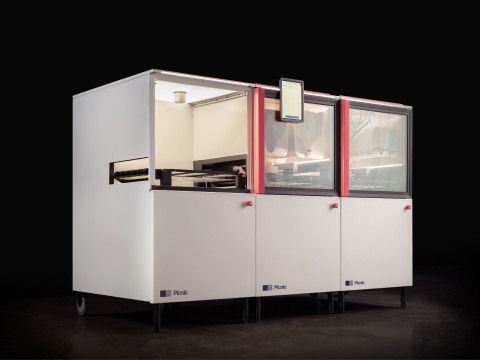Silicon Valley is still on its quest to bring robot-made pizza to the masses even after SoftBank-backed Zume, which at one point was said to be valued at $4 billion, shuttered its delivery service in January 2020. Seattle-based pizza assembly startup Picnic believes it has cracked the code on the robot pie game.
“We had a lot of interest across the spectrum but pulling a round together is always tricky when you are a hardware company, especially in food automation,” CEO Clayton Wood tells AFN.
“There is a growing graveyard of early pioneers in the food automation space so it takes an act of faith to believe that we are the ones who de-risked it. But I think we are.”
Picnic recently raised a $16.3 million Series A round led by Thursday Ventures. Other investors in the round include Creative Ventures, Flying Fish Partners, and Microsoft co-founder Paul Allen’s Vulcan Capital.
The startup describes its Picnic Pizza System as a modular assembly line that can be customized to a user’s specific requirements and recipes. The robot puts the pie together and connects to a conveyor oven to complete the cooking process. While the system is well-suited for high-volume, high-consistency pizza production, it’s also food agnostic, according to Wood.
“Our technology is applicable to any food you can assemble: sandwiches, salads, bowls, tacos,” he says.
“We are focused on pizza at the moment because we’ve been a small startup with limited funding. This will enable us to start exploring some of those other opportunities.”
The robot appears to be making a splash in the agrifoodtech scene. Picnic received National Restaurant Show’s Kitchen Innovations 2021 Award and was a GeekWire 2021 finalist for the Hardware/Gadget/Robotics of the Year category. It was also included in The FoodTech 500 2020 by Forward Fooding and was selected for the Foodservice Robotics Pioneer Award at Spain’s Expo HIP 2020 as well as showcasing at Best of CES 2020.
One of the bots took up residence at the San Francisco Giants’ Oracle Park for the 2020 baseball season, before Covid-19 hit. It made 1,900 pizzas for the Winter Carnival event held at the stadium, too.
“We have worked with a franchise customer and we are in a slow rollout now. We don’t have any systems in the field today but we have multiple major customers that we are talking to in different segments including managed foodservice, branded pizza, and convenience store retail,” Wood says.
During 2020, Picnic made a few tweaks to its system including a new design, interface, safety features, and food handling considerations. These were directed towards the startup’s ultimate goal, which is to address challenges around labor shortages, quality control, and consumer experience.
The funding will be used to scale up commercial operations and make new hires. Wood says the past year has been focused on gaining feedback from Picnic’s customers, which range from restaurant owners to stadiums, hospitals, and colleges, and more. The startup plans to announce more Picnic Pizza System deployments later this year while ramping up overall production volume, he adds.
Partnering on pizza
Picnic has announced a number of strategic partnerships across the foodservice industry, including a tie-up with Orion Land Mark – which claims to be the largest supplier of pizza and pizza components to the convenience store segment.
The startup will also start working with Ethan Stowell Restaurants through a culinary and chef-focused partnership. This will likely involve opportunities to showcase the robot at pop-up shops throughout the Seattle area.
Picnic’s also partnering with foodservice equipment company National Service Cooperative, which will help it with customer support, service, and equipment maintenance; while a tie-up with Baseline Hardware Financing will provide financial support for customers who purchase its robot.
“We find ourselves in a perfect storm where the industry is even more labor-challenged than it was before the [Covid-19] pandemic,” Wood says.
“Costs are high, labor is short. Automation is increasingly acceptable and in demand, and there are very few players. That’s why we’re building all these partnerships and processes. We haven’t been focused on just getting a little bit of revenue. We are really setting up for the long run.”
Among the other autonomous chefs on offer out there, Canada’s YPC Technologies is developing robots that can collaborate with human workers in lieu of replacing them – while White Castle has hired Miso Robotics’ burger-flipping bot, Flippy.
According to Wood, however, Picnic has a robot leg up on the competition.
“We see a lot of new entrants in the space. A lot of them have taken what I consider to be a shortcut using an industrialized robotic arm, which is not cost-effective and is not safe to work around. I think our system is the best for throughput and customization because it’s completely modular and configurable.”





